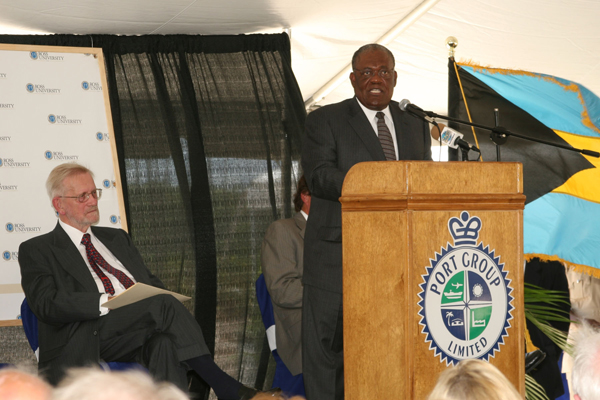
The Right Hon. Hubert A. Ingraham, Prime Minister of The Bahamas gives remarks at the Ross University Bahamas Campus Announcement Ceremony on July 28, 2008. Sitting left is Eric Christiansen, Chairman, Chairman, Port Group Ltd. Photo: Derek Carroll
|
Remarks by
Rt. Hon. Hubert A. Ingraham
Announcement of
Ross University Branch
Freeport, Grand Bahama
Monday, 28th July, 2008
Good Afternoon Ladies and Gentlemen:
I am very pleased to be a part of this occasion to welcome Ross University to Freeport, Grand Bahama.
I look forward to a long and mutually beneficial relationship between Ross University and The Bahamas.
For many years, we in The Bahamas resisted becoming involved in the growing American off-shore medical education business and to become involved in the question of offshore Universities.
Forty years ago attempts were made to create a University here in Freeport and for more than 20 years, offshore medical schools have been seeking to enter The Bahamas.
We were very interested to ensure that any who might be permitted to come would meet international standards and be a credit and not a discredit to The Bahamas.
So, we are coming to the party late.
We have now agreed terms with Ross University which has received our approval to open a branch of its School of Medicine here in Freeport, Grand Bahama.
We are satisfied that Ross University is the right institution and that its operation here will bring credit and not discredit to The Bahamas.
The University will ultimately be located here on this site acquired from the Grand Bahama Port Authority near the heart of downtown Freeport but its initial operations will be located at an interim campus at the Seahorse Shopping Plaza in Freeport.
The University programme in Grand Bahama begins as a branch of the institution’s medical programme in Dominica.
The Freeport branch campus will accommodate increased enrolment at the medical school that can no longer be accommodated at existing facilities.
Enrolment has been projected to start at approximately 250 students, and is expected to grow to over 1,000 students within the first three years.
In the longer term, the campus could grow to accommodate as many as 3,000 student, and possibly also serve as a location for possible additional graduate medical programmes.
I need not tell you the impact which Universities have upon cities, communities or towns situated near them. But I want to take this opportunity to thank the Port Authority for its tenacity in bringing this venture to fruition, and to also say to the University that it was not easy to get the government bureaucracy to change its mindset about not having offshore medical centres in The Bahamas.
I expect that Ross University is going to provide five scholarships annually to Bahamians.
I believe that the decision by Ross University to locate a branch campus in Grand Bahama bodes well for this island.
It is particularly good news for Grand Bahama representing a first important turn in the road to economic recovery and vitality missing from this island since the terrible hurricane seasons of 2004 and 2005 and the closure of the Royal Oasis Hotel.
Ross University is in the process of preparing a formal economic impact study with respect to its potential Freeport campus.
Based on what they have done in Dominica, I think it is fair to say that the principal economic impact and related benefits will result from the direct influx of revenue to the local economy from international students who will come to live and study in Freeport.
Additional benefit will flow from the employment of Bahamians in many capacities. Ross University anticipates that a significant per centum, if not the majority, of its staff will be Bahamian nationals.
Using its current Dominica campus as a model, once enrolment reaches 1,400, approximately 250 Bahamian residents can be expected to be engaged out of the total staff of 400, including many technical and professional positions.
Staff members and their immediate family, including spouses and dependant children, are entitled to generous tuition discounts and scholarships at all of DeVry’s education and training programmes throughout the United States, online, and internationally.
Another source of financial inflows to this community will result from the provision of transitional housing for a portion of the faculty and students.
The University expects to construct on-campus student housing to accommodate approximately 30% of students and faculty. This housing may be built in partnership with experienced local developers.
The housing of the remaining 70% of staff and students off-campus will provide excellent opportunities for Bahamians engaged in the housing rental market.
Indeed, student and staff spending on housing, food, transportation, and other direct living expenses can be expected to account for additional tens of millions of dollars inflow into the Grand Bahama economy annually.
Additionally, Ross University anticipates providing an additional $35 to $60 million dollars in construction spending during its initial three to five years of operation, significantly impacting the construction sector of the economy.
Finally, the Grand Bahamas tourism sector can expect to benefit from the travel to and from the Freeport campus by staff, students and their families.
This is an exciting new venture for Grand Bahama.
Once again, on behalf of the Government and people of The Bahamas I extend very best wishes to the principals of Ross University and their parent corporation DeVry Inc.
I congratulate the Grand Bahama Port Authority, its Chairman, President and Sir Jack Hayward for their continued commitment to develop and expand economic opportunities for Freeport.
I say this notwithstanding the continuing and hopelessly lengthy wrangling and squabbling which continues between the owners of the Port Authority.
I finally note, that Eric Christensen is someone with whom I and my Government are happy to do, and to continue to do, business if he is allowed to do business with us.
